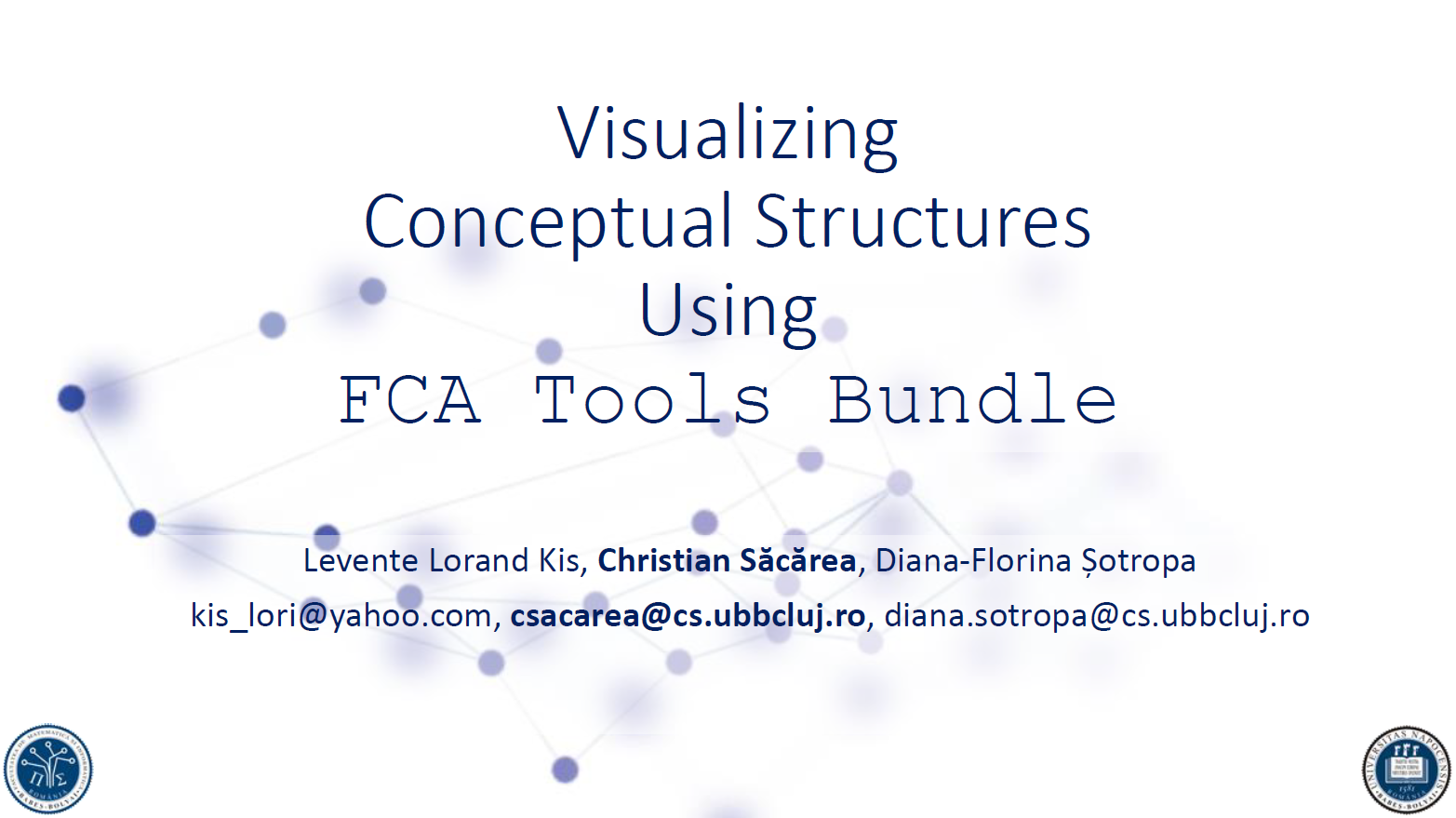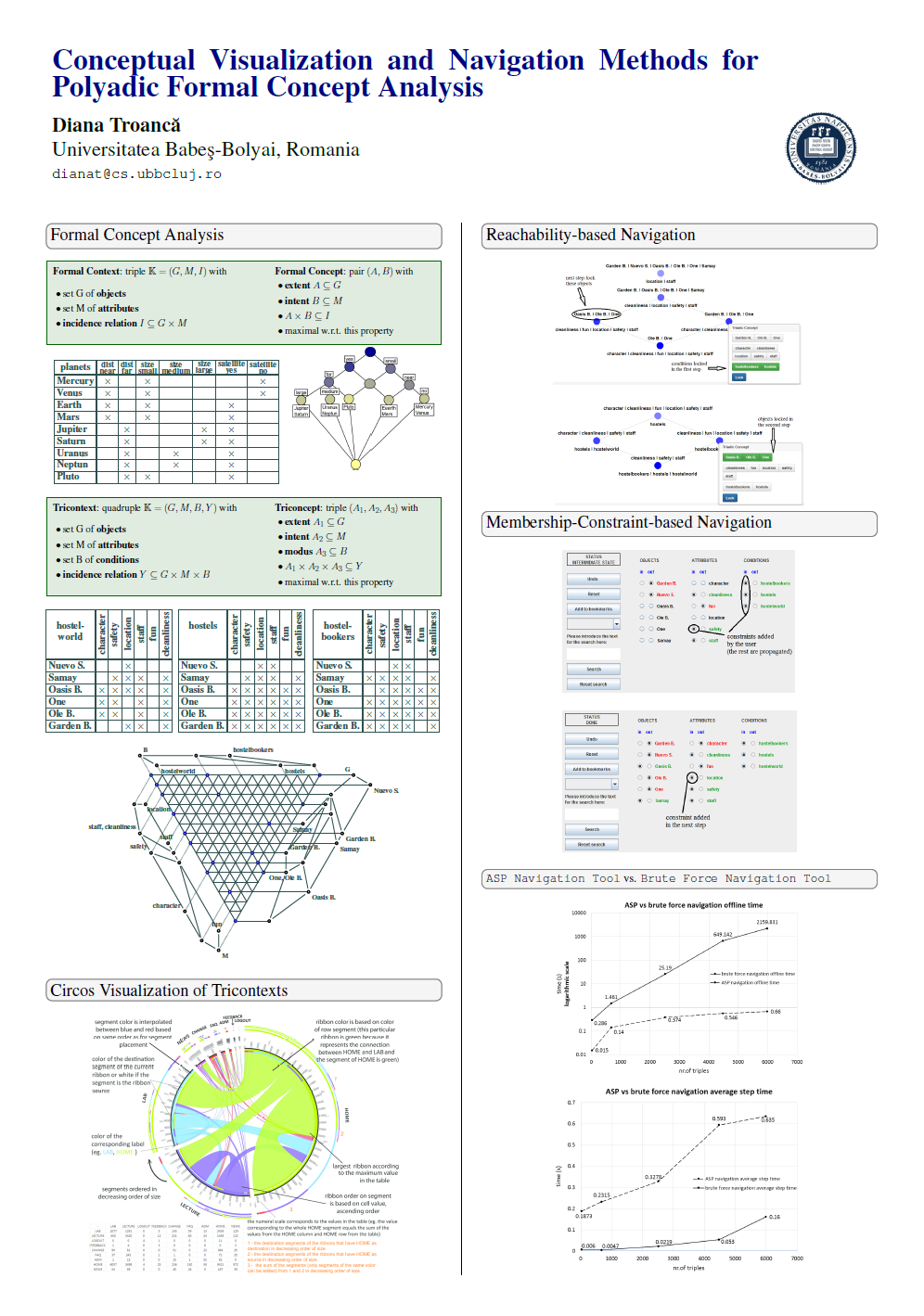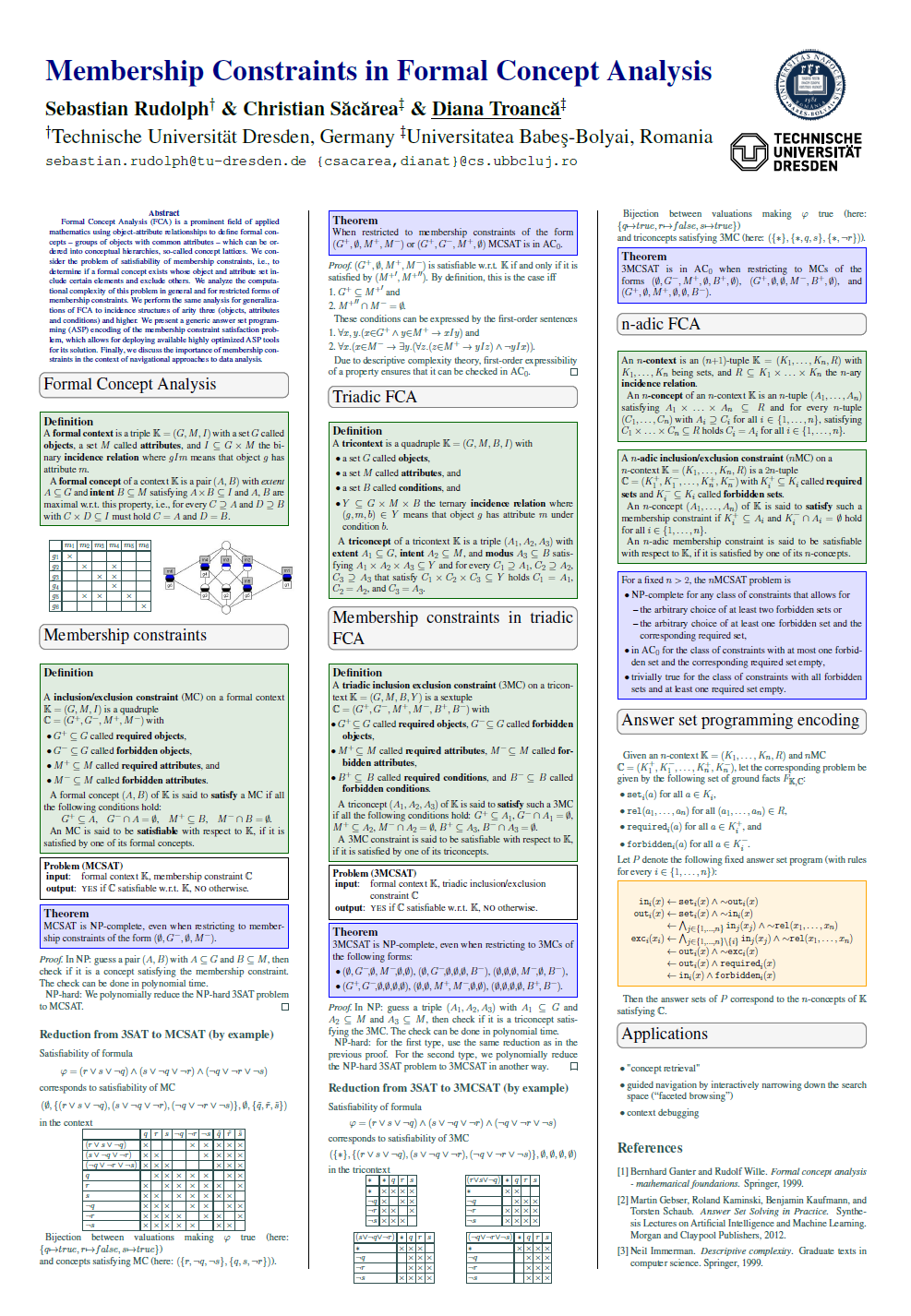Abstract:
Formal Concept Analysis is well known for the intuitive and graphical representations of lattices. While there are a lot of algorithms mining for formal concepts in the dyadic case, there are not many tools offering this feature for multidimensional datasets. The purpose of this paper is to present FCA Tools Bundle and its various features, ranging from importing the data in several formats to offering full support to explore your data using different navigation and exploration methods.
Keywords:
Formal Concept Analysis, representations of lattices, explore your data, different navigation and exploration methods
Using VR to Explore Life Tracks
Abstract:
Temporal Concept Analysis (TCA) has been developed with
the aim to investigate conceptual structures in data with a temporal
layer. Nevertheless, there are not so many tools enabling the visualization
of TCA features. We propose a new approach based on virtual reality
with a 3D representation of concept lattices in which life tracks of objects
can be displayed and explored. This is done by exporting the well-known
Toscana tool for visualizing conceptual landscapes in a virtual reality
(VR) environment and then display various TCA features on the selected
scales.
Keywords:
Temporal concept analysis, Virtual Reality, 3d representation, concept lattice
Visualizing Conceptual Structures Using FCA Tools Bundle
Abstract:
Formal Concept Analysis (FCA) is a prominent field of applied mathematics organising collections of knowledge - formal concepts - as conceptual landscapes of knowledge. FCA proved to be a promising theory to extract, analyse and visualise conceptual structures arising from various data structures. One of the strengths of FCA is the elegant, intuitive and powerful graphical representation of landscapes of knowledge as concept lattices. The purpose of this paper is to present FCA Tools Bundle and its various features, which is a bundle of tools for dyadic, many-valued, triadic and even polyadic FCA.
Keywords:
Formal Concept Analysis, FCA Tools Bundle, Knowledge, concept lattice
Navigation and Exploration Tool for Polyadic FCA
Abstract:
Formal concept analysis (FCA) is a powerful mathematical tool that allows deriving concept hierarchies from large sets of data in order to analyze data and derive meaningful information from it [3]. FCA finds practical application in fields including data mining, text mining, machine learning, knowledge management, semantic web, software development, chemistry, biology and many more. FCA works with contexts and concept lattices derived from them. Since navigation in three-dimensional spaces is rather difficult, one method of navigation in
tricontexts uses local projections and reduces the triadic contexts to multiple dyadic contexts. The purpose of this paper is to present FCA Tools Bundle, which is a collection of tools for dyadic and triadic formal concept analysis. Furthermore, in this paper, we describe the architecture of the tool and the technologies used in its implementation.
Keywords:
FCA, Triadic Context, Navigation Tool, Concept Lattice
FACT – A Tool for Temporal Formal Concept Analysis
Abstract:
Formal Concept Analysis offers an elegant, intuitive and powerful graphical representation of landscapes of knowledge as concept lattices.
In this paper, we report about the current state of FACT, a tool for temporal data analysis and knowledge discovery. FACT is a web-based application which allows an online interaction with larger data sets in order to explore and analyze data conceptually. It uses concept lattices in order to extract knowledge from the data set. After presenting the tool itself we shortly describe an example and present the planning for further development.
Keywords:
Life tracks, Temporal Concept Analysis, Web logs analysis, Conceptual structures, User behavior, Attractors
Conceptual Visualization and Navigation Methods for Polyadic Formal Concept Analysis
Abstract:
Conceptual knowledge is closely related to a deeper understanding of existing facts and relationships, but also to the argumentation and communication of why something happens in a particular way. Formal Concept Analysis (FCA) is the core of Conceptual Knowledge Processing. It emerged from applied mathematics and quickly developed into a powerful framework for knowledge representation. It is based on a set theoretical semantics and provides a rich amount of mathematical instruments for representation, acquiring, retrieval, discovery and further processing of knowledge. FCA was introduced in the dyadic setting [Ganter and Wille, 1999] and extended to a triadic [Lehmann and Wille, 1995] and eventually n-adic setting [Voutsadakis, 2002]. Intuitively, dyadic datasets can be understood as objects related to attributes and, in addition, to conditions for the triadic case. FCA defines concepts as maximal clusters of data in which all elements are mutually interrelated. A common problem for n-adic FCA is concept visualization and navigation. The goal of my thesis is to find visualization and navigation paradigms that can be applied to higher-dimensional datasets. Therefore, we study the triadic case and propose several visualization and navigational approaches. Furthermore, we evaluate these approaches, study their generalizations and extend them, where possible, to n-ary formal contexts.
Keywords:
Conceptual Knowledge Processing, Formal Concept Analysis, visualization, navigation, higher-dimensional datasets
Membership Constraints in Formal Concept Analysis
Abstract:
Formal Concept Analysis (FCA) is a prominent field of applied mathematics using object-attribute relationships to define formal concepts – groups of objects with common attributes – which can be ordered into conceptual hierarchies, so-called concept lattices. We consider the problem of satisfiability of membership constraints, i.e., to determine if a formal concept exists whose object and attribute set include certain elements and exclude others. We analyze the computational complexity of this problem in general and for restricted forms of
membership constraints. We perform the same analysis for generalizations of FCA to incidence structures of arity three (objects, attributes and conditions) and higher. We present a generic answer set programming (ASP) encoding of the membership constraint satisfaction problem, which allows for deploying available highly optimized ASP tools for its solution. Finally, we discuss the importance of membership constraints in the context of navigational approaches to data analysis.
Keywords:
Formal Concept Analysis, membership constraints, answer set programming






